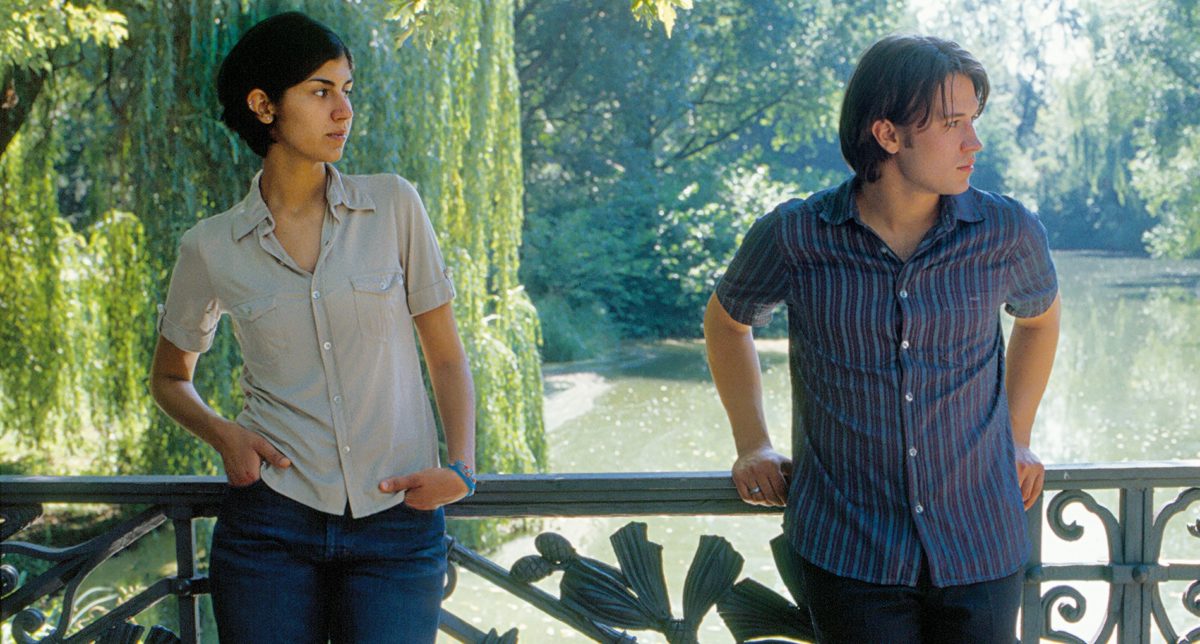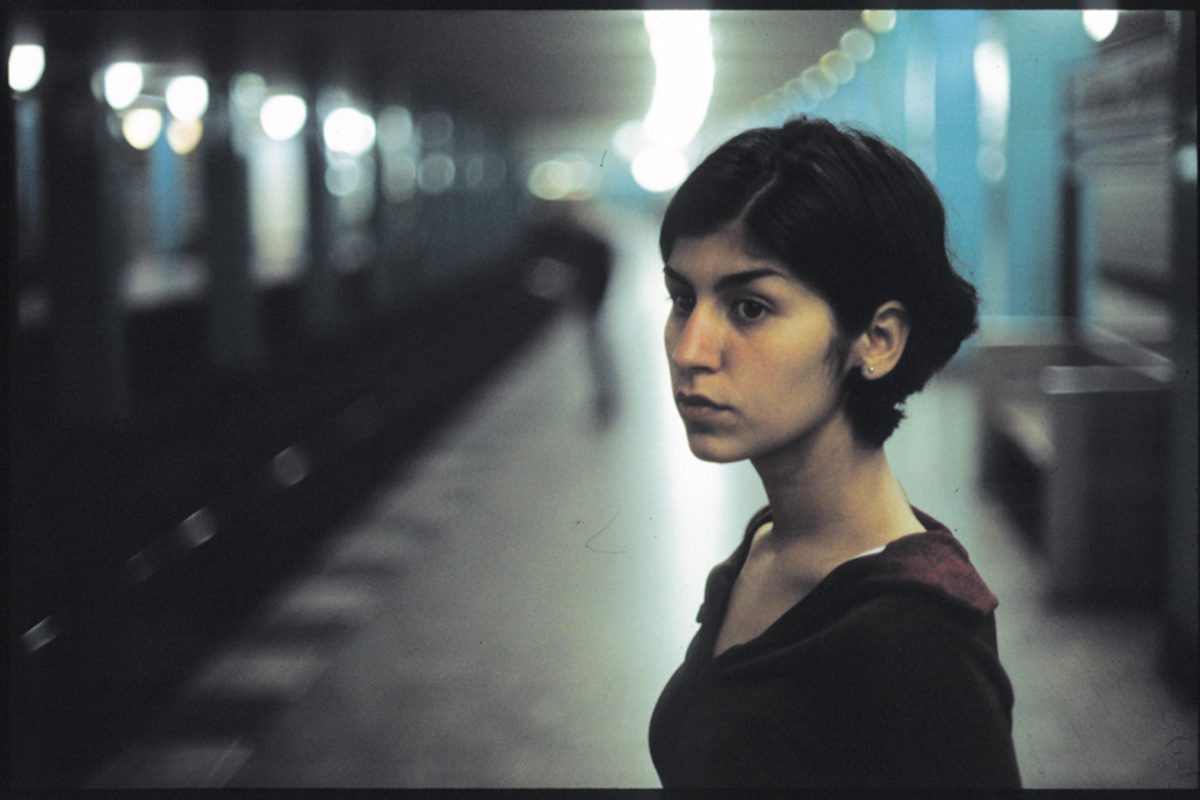In Thomas Arslan’s films, his solitary characters often wander. Whether it is with defined purposes, like the cold thrill of a new heist job in underworld Berlin, or more elusive ones where the city becomes its own maze for reticent self-reflection—the spaces they pass through reveal a subtler internal tension beyond its overt narrative. Words spoken merely provide a clue to what is brewing under the surface, and even when the stakes are high, Arslan’s restrained visuals and minimalist environments render an element of quotidian drawl amongst life’s complexities.
The distanced, yet meticulous style is one of many related aesthetics of the ‘Berlin School’: a critically-designated term used to describe an open association of German filmmakers, initially given to Thomas Arslan, Christian Petzold and Angela Schanelec. Particularly, it situates their young, observant characters against the aftermath of the fall of the Berlin Wall, where contemporary societal shifts challenge a modern German cultural identity.Rejendra Roy, 2013, The Berlin School Films from the Berliner Schuele, The Museum of Modern Art, New York, 11. Seen more as an allegiance of filmmakers rather than an official collective, the ‘Berlin School’ designation doesn’t necessarily capture all the nuances of its members, as well as its cosmopolitan origins, however they are generally bound together by the significant subversion of classical narrative filmmaking and their commitment to film as art and a means of personal expression.Marco Abel, 2008, ‘Intensifying Life: The Cinema of the “Berlin School”‘, Cineaste (accessed 20 November 2020). This ‘German phenomenon’ has also moved beyond a locale-specific term, with directors Jessica Hausner (Austria), Kelly Reichardt (USA), even Naomi Kawase and Hirokazu Kore-eda (Japan) included as well for their introspective approach to storytelling —unsettling pacing, tempo and rhythm to a degree which unhurriedly immerses their characters into their surroundings, leaving us guessing at their emotional states.
Arslan’s Der schöne Tag (A Fine Day, 2001) is arguably the film which coined the name “Berlin School”, with film reviewer Rainer Gansera describing it as “low-key cinema, devoted to the real as well as to realism, of a rare formal rigour and a stubborn tenderness.” As the final film of the ‘Berlin Trilogy’, consisting also of Geschwister – Kardeşler (Brothers and Sisters, 1995) and Dealer (1998), his early films speak most openly to Arslan’s German-Turkish background, in a way which grapples with the multi-locality of Germany’s social landscape, and its Turkish immigrant and diasporic communities. Much writing dedicated to Arslan’s filmic authorship has been focused around this trilogy, particularly looking at the way he breaks away from the dominantly victimised, stereotypical image of migrants in Germany—in his more realistic depictions, marginalised characters who struggle with cultural hybridity or a ‘third-space’. These films ask the question: what happens when diasporic subjects cannot identify with a romantic notion of nationhood which is built on homogenous ideals of “shared language, culture and identity”?Anna Bátori, 2017, ‘The Flux of Transmigrant identities in Thomas Arslan’s Brothers and Sisters’, 14 Film & Media Studies, 55. As academic Anna Bátori writes, it is this very dilemma—complicated by globalisation—which leaves them to inhabit a ‘transmigrant identity’: one which goes between stagnating or drifting in-between positions.
Both Brothers and Sisters and Dealer deal more outwardly with the hyphenated identities of its second-generation Turkish-German protagonists, whereas A Fine Day more subtly integrates the ethnicity of its leading character, Deniz (Serpil Turhan), a Berliner actor of Turkish origin, as she meanders through a single day—pondering philosophical questions of contemporary ideas of love, work and life. It’s a film worth examining for its stripped-back approach to personal identity, and the impenetrable, strange intimacy that comes from surveying Deniz’s steps through Berlin’s cityscape. Thomas Arslan, too, notes the importance of the film’s protagonist not solely defined by her Turkish-German culture:
It’s doing something else than constantly dealing with her identity. It was important to me not to define her in terms of what is supposedly “foreign” about her. The much-invoked conflict between two cultures does not correspond to her life experience.Quoted in Daniel Bax, ‘Voll aus dem Leben’, Tageszeitung, 8 July 1997.
A Fine Day opens on a shot of the blue sky, cutting to a light draft on the blowing curtain of a slightly ajar door, and a man sleeping in bed. A woman, with short dark hair looks on, her face turning from left to right, before walking down the stairs of an apartment, right out the door. Already, Arslan establishes the way the film is structured around Deniz’s transitory movements: as she’s walking through the park; onto the U-Bahn, watching a daughter sleep on her father; up the stairs to her own flat. In largely relying on non-diegetic sound and long takes, our attention is attuned to her every footstep on the pavement, the clatter of a tea cup, the screeching rails on the track. This hyperawareness draws us into the urban topography Deniz moves through, giving us the time to observe the places she pauses in, and enters into—even when they are wandered into with little meaning.

Arslan orchestrates these open, natural spaces, and sparse interiors to reflect a quieter contemplation rooted at the core of Deniz’s otherwise goalless destinations. Any plans or meet-ups with other people are simply painted as unremarkable as the rest of her day, weaving themselves into the fabric of the moments in-between. An argument in a café with her German boyfriend, Jan (Florian Stetter) becomes heated as they discuss the tensions in their relationship, but cinematographers, Kristina Klunkert and Michael Wiesweg’s control of the camerawork barely allows it to feel like a direct confrontation. The camera revolves around Jan’s right shoulder across to hers, but the simple blocking, and the minimal camera movements, create a detachment from their extrinsic frustrations, and in turn, internalise their specific emotions. “You want to fight?” he asks, “That’s impossible with you,” she replies. It’s later when they end up at a park, near a lake, that she finally asks him the overhanging question: “Should we break up?” The camera holds on a side angle of both of them, the position of Deniz’s face in front of Jan’s. “You’re a coward,” she says to him. The only movements she makes are with a slightly exasperated gesture of fingers splayed across her face, “You really don’t understand anything.” The relatively flat vocal intonation of Tuhran’s dismissive delivery of “it’s over, that’s all,” and Jan’s consequently quiet exit out of frame, homes in on the silence of Deniz’s environment as she is left sitting alone staring into space.
This spatial separation from Deniz as a way of watching her and who she sees, yields a naturalistic ‘slice of life’ effect, while withholding dramatization of narrative points. Arslan instead mystifies her thoughts through his stylistic construction, externally displaying what she is doing, and even her minimal facial expressions—but denies engagement with the motivations behind them. When we first see her new potential love interest, Diego (Bilge Bingul), it’s through Deniz’s gaze: she spots him across the platform, before he makes direct eye contact with her. The medium reverse shots as they take small, glances at and away from each other could mean something—they could also not. As he steps on board the train, he looks out at her through the door, and her gaze follows him as it rides away. Diego and Deniz’s instant connection and eventual chance meeting have resonances to Richard Linklater’s Before Sunrise (1995), especially in the scenes where the couple stroll through the park, arms nearly touching, their easy conversation passing the time. “I feel uneasy in places I don’t know,” she tells him.
Unlike Linklater’s romantic oeuvre, it’s ambiguous whether a spell has truly been broken at the end of the night—but its significance is centered on a certain existentialism that follows Deniz around, as if the places she ventures into become places of respite from stalling in the lingering restlessness of living in a modern, capitalist society. While Arslan’s contemporary, Christian Petzold, also plays with the interaction of his characters and Berlin’s urban architecture to embed a “thread of historicity and self consciousness”Savina Petkova, 2020, ‘Christian Petzold’s Material Symbolism’, photogénie (accessed 22 November 2020)., A Fine Day hints at the deeper conditions of losing oneself in the cityscape, unable to express emotion, or to escape the trappings of modern-day alienation. In one of the film’s final scenes, Deniz begins talking to a university lecturer in a café who studies “quotidian matters” and the history of romantic conduct. She converses with Deniz about the idealised conception of romantic love, and its changing meaning in the present. There is some truth, she says, to gestures and gazes, the very ones we observe Deniz making on the train and as she walks down the streets, but that its value is mostly immediate. Deniz’s discursive tracks—seemingly in pursuit of inconsequential objectives—becomes an unsaid, underlying desire for stable connection.
This sense of introspective displacement—through a representation of motion and stasis —becomes a critical part to understanding how Arslan’s craft, thematically and visually, has since evolved into the last decade. His careful eye for space and composition enables his characters to feel both enclosed and freed, excluded and included, within the places they occupy—and the rigorously devised mise-en-scène allows us to dwell in how and where they are placed, and where they go. Arslan’s latest film releases appear to mark a shift in scale and genre for the filmmaker, moving between the neo-noir crime thriller, Im Schatten (In the Shadows, 2010), revisionist Western, Gold (2013), and road movie, Helle Nächte (Bright Nights, 2017). Yet, embedded in all these works, is still his trademark clinical precision and deliberately understated aesthetic which speaks to his characters’ silent identity crisis’. In Bright Nights, which won the Silver Bear for Best Actor at the Berlin International Film Festival, the green parklands of Norway become the terrain for the stewing tension between an estranged father, Michael (Georg Friedrich) and teen son, Luis (Tristan Göbel). Gold (2013) stars Nina Hoss as Emily Meyer, a German immigrant who joins others for the desperate search for gold in the remote mountainous alps of British Columbia. In these films, the outdoor plains stretch outside an urban sphere, a contrast to the tight metropolitan interiors which situate In the Shadows’ reserved anti-hero, Trojan (Mišel Matičević) within claustrophobic cars, motel rooms, and underground parking lots.
In the painstakingly constructed and selective use of space, Arslan bestows an unshakeable attachment to his main characters, while maintaining an unconventional estrangement that prevents us from truly accessing what lies beyond their presented stories. While Deniz, Georg, Emily and Trojan are often surrounded by others, they eventually find themselves, at the very end of their journeys, alone. They don’t merely wander, in fact, they’re surviving—and even when we have stopped watching them—they continue to move, to search.
